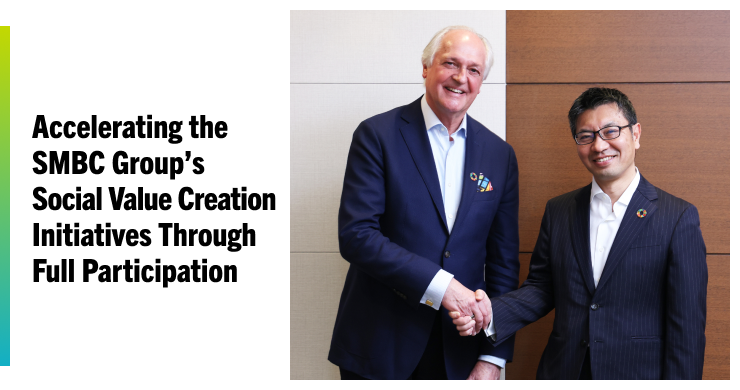CSuO × Global Advisor Dialogue

-
(left) Paul Polman Paul Polman was appointed as an SMBC Group Global Advisor on March 2023. During his time as CEO of Unilever PLC (“Unilever”), Mr. Polman introduced “Unilever Sustainable Living Plan (USLP),” a business plan that positioned the solving of social issues as a key pillar and endeavored to balance sustainability and corporate growth.
-
(right) Masayuki Takanashi Executive Officer
Group CSuO
Mr. Paul Polman, an SMBC Group Global Advisor, and Mr. Masayuki Takanashi, the Group Chief Sustainability Officer (CSuO) met to discuss the SMBC Group’s social value creation initiatives and the future outlook.
Takanashi: The SMBC Group has emphasized the importance of full participation—the involvement of all Group employees—in its initiatives to create social value. In the two years since the start of the Medium-Term Management Plan, our employees have definitely changed their mindset, as demonstrated by their focusing on the social issues affecting our customers and engaging in dialogue therewith to address these issues.
Polman: I think that the SMBC Group’s initiatives to create social value have made steady progress relatively quickly. An important aspect of this change in mindset is the growing understanding among employees that their efforts to create social value will contribute directly to corporate growth. Looking back on my time as CEO of Unilever, it took around five years for employees to develop such a mindset. Accordingly, I have been impressed with how quickly the SMBC Group has worked to transform the mindset of its employees. Particularly noteworthy are the Group’s efforts to inspire employees to autonomously carry out unique initiatives, such as the holding of Shaka-kachi DAY, which involves employees at sites in Japan and overseas focusing on creating social value. I also commend the commitment demonstrated by the Group’s senior management team in incorporating sustainability-related evaluation criteria into the executive compensation system. It is clear that employees and senior management are working as one.
Takanashi: Thank you. In addition to full participation in the SMBC Group, we aim to expand the circle of social value creation initiatives to involve society as a whole. For example, we are working to create an investment framework for addressing social issues by leveraging our functions as a financial institution. We recently launched impact investment targeting start-ups and are developing products that will create a virtuous cycle of social value creation, including the provision of philanthropic advisory services allowing us to act as an intermediary between wealthy individuals and non-profit organizations and other bodies that tackle social issues. In 2024, we became the first major financial institution to issue Impact Report, which introduces the outcomes of our initiatives using the new metrics of impact.
Polman: The SMBC Group’s publication of an impact report ahead of its peers is a significant achievement that goes beyond mere information disclosure. I believe that quantitatively evaluating the Group’s social value creation initiatives and their outcomes and disclosing them in tangible form using the new metrics of impact help boost momentum for such initiatives both internally and externally.
Takanashi: I agree. We are convinced that presenting both positive and negative impacts of business activities on society and the environment will become increasingly important as a new metrics for measuring corporate value, so we will continue challenging ourselves to provide progressive disclosure. Meanwhile, as the SMBC Group can only achieve so much on its own in terms of creating social value, it is focusing efforts on building partnerships with a variety of stakeholders. For example, we strengthened our cooperation with academia in 2024 and are advancing various other efforts, including joint research on social issues with several universities and the practical application of research findings in society as well as the development of human resources. Also, we are actively promoting collaboration with NPOs and corporates.
Polman: Concerning environmental initiatives, I would also like to commend the SMBC Group for issuing its “Transition Finance Playbook” before other financial institutions. Looking at global energy investment trends, investments in green energy came to US$2.1 trillion in 2024, and the green economy is projected to be worth US$15 trillion by 2030. Supporting the energy transition is an important duty for financial institutions. Today, the world is facing a “polycrisis,” where multiple crises are proceeding simultaneously, including climate change, the loss of biodiversity, and rising poverty and inequality. Although these circumstances are challenging, as new alliances form and technological progress accelerates during this major transition period, I am confident that the SMBC Group will make steady progress in tapping into developing trends. I hope the Group will continue to grow as a global financial institution that contributes to the realization of a more sustainable, more inclusive world.
Takanashi: Today’s discussion has reaffirmed my belief that the SMBC Group’s initiatives are impacting society positively, at least in some small way. The Group will therefore continue playing a leading role in creating social value and taking action to address social issues through full participation, including myself. By doing so, the Group can make social value creation a strength in order to achieve its ultimate goal of realizing “Fulfilled Growth” and increasing its corporate value.